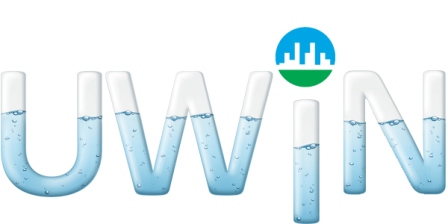UWIN INTEGRATION TASK FORCE
Testbed Studies
Objective
Test bed studies include technological, policy, institutional, and financial pathways that foster:
- Integrated planning and management of urban water systems; and
- Promotions of transitions toward a “resource management” model, which aims to maintain or restore the natural and social capital of cities, including:
- Reliability of water supply, water quality control, and flood control services
- Resilience to changes in climate, population, land use, and economic conditions
- Biodiversity (functional diversity)
- Social environmental justice and equity
- Community health and livability
Products
- One or two high impact journal papers (in addition to the synthesis papers)
- Reports from agency stakeholders engaged in the test bed study (i.e. cross city report) and perhaps a formalization of their urban testbed network
- Publication with WRF highlighting efforts
- Reports/outputs to EPA and other “applied communities”
- An article in stormwater management magazine
Participants
- Adam Douglas Henry
- Alex Mahalov
- Ali Mostafavi
- Andy Miller
- Brian Bledsoe
- Chingwen Cheng
- Chris Swan
- Claire Welty
- David Hondula
- Gary Pivo
- Jenn Stokes-Draut
- Jennifer Cherrier
- Jim Smith
- Mary Santelmann
- Mazdak Arabi
- Shirley Papuga
- Sybil Sharvelle
- Thomas Meixner
Evaluate the Effects of Fit-for-Purpose Use of Alternative Water Resources
Primary Contact: Mazdak Arabi (mazdak.arabi@colostate.edu)
Goals and Objectives
The goal of the study is to evaluate the effects of fit-for-purpose use of alternative water resources from wastewater, stormwater, and graywater on water demand and wastewater production.
Specifically, the study investigates how adoption of these strategies influences water and wastewater infrastructure reliability and resiliency at municipal scales. The objectives of the study are to investigate:
- Effects of water demand and drinking water infrastructure reliability
- Wastewater collection infrastructure reliability
- Effects on rates for services and subsequent effects on affordability
Current Activities
Cross site comparisons will be conducted to explore impacts across ecohydrologic regions and under varying population, land use, and climate change conditions. The study will result in a scientific paper published in a high impact journal such as Environmental Science & Technology, expected completion by May 2019.
Study locations
The study will be conducted in Denver, Fort Collins, Phoenix, Tucson, Portland, LA, Miami, Baltimore, New York City, Chicago, and Detroit.
Milestones and Timeline
- Confirm/recruit participants – November 2018
- Identify methods and approach – December 2018
- Collect and assimilate data – January 2019
- Synthesize data and begin drafting paper – February 2019
- Select appropriate journal(s) for submission – March 2019
- Paper submission – May 2019
Study Participants
The project will require participation by various UWIN researchers with interdisciplinary expertise, including:
- Mazdak Arabi (Study Lead)
- Ali Mostafavi (Infrastructure Modeling)
- Arpad Hovrath (LCA)
- Matt Georgescu (Future Climate and Urban Expansion Scenarios)
- Alex Maas (Economic Analysis)
- Liz Mack (Affordability)
- Sharon Harlan (Equity and SEEJ)
- Sybil Sharvelle (Alternative Water Systems and Environmental Engineering)
Water Flux From Vegetation Communities across Green Infrastructure Types
Primary Contact: Christopher Swan (cmswan@umbc.edu)
Goals and Objectives
Connect water dynamics to plant species composition by measuring water flux (transpiration) on GI where greening was implemented. Will get at interspecific variability in water stress, use. Would fine tune what “green” means to water dynamics in models of GI performance.
Current Activities
We have worked out a sampling approach to (1) characterize local plant species composition in cities, (2) adequately assess stomatal conductance of water from leaf surfaces, and (3) can place the readings into appropriate environmental context with soil moisture readings, soil/air temperature, sunlight (PAR), and recent precipitation events. We have also sorted out expectations for plants exhibiting different photosynthetic strategies – C4, C3, CAM – to place plant assemblage level performance into context.
Study Locations
The number of cities is to be determined as are the specific sites within cities. The goal is to contact key researchers within the UWIN network to identify at least 4 cities with significant, cross-disciplinary studies ongoing and, hopefully, in 3-5 different GI types (see timeline below). One site we know will be involved is Dead Run in Baltimore. PI’s Welty, Miller and Smith have been engaged already. We can hopefully involve Meixner and Jennerette in AZ and CA as well. It would be ideal to have two mesic and two somewhat xeric cities covered.
Milestones & Timeline
- January (2019) – contact and confirm PI agreement to be involved
- February:
- organize specific sites within each city, summarize GI types
- discuss potential comparisons between types and cities
- Summarize cross-disciplinary connections
- March – Organize logistics for sampling
- April – conference call with participants and learn the extent of Swan’s and graduate student’s travel vs distributing equipment (soil and conductance meters) and sampling protocols
- May-July :
- sampling
- presentation of any initial results at UWIN annual meeting
- August – data organization, integration and visualization
- September – final report and begin conversations about integration with other disciplinary efforts
Participants
As stated, we will definitely include PI Welty and colleagues in Baltimore, and anticipate positive responses from PIs Meixner and Jennerette in AZ and CA, respectively. PI Swan will work with one graduate student funded by UWIN to coordinate the sampling. This may include significant travel between sites.
